Unit 7 Will people have robots? Section A人教版初中英语八年级上册课件(共48张PPT)
文档属性
| 名称 | Unit 7 Will people have robots? Section A人教版初中英语八年级上册课件(共48张PPT) | 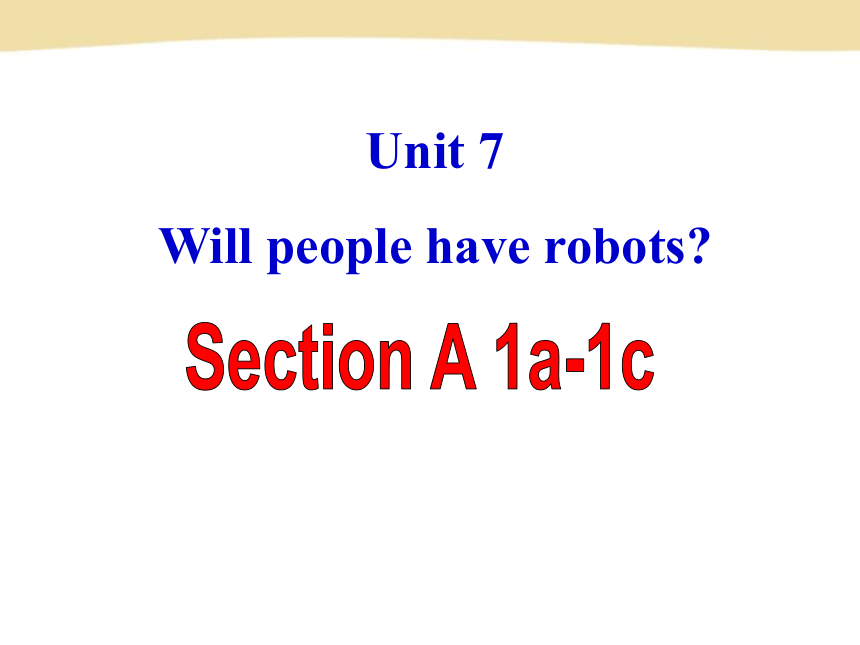 | |
| 格式 | ppt | ||
| 文件大小 | 3.1MB | ||
| 资源类型 | 教案 | ||
| 版本资源 | 人教新目标(Go for it)版 | ||
| 科目 | 英语 | ||
| 更新时间 | 2022-10-06 11:29:08 | ||
图片预览

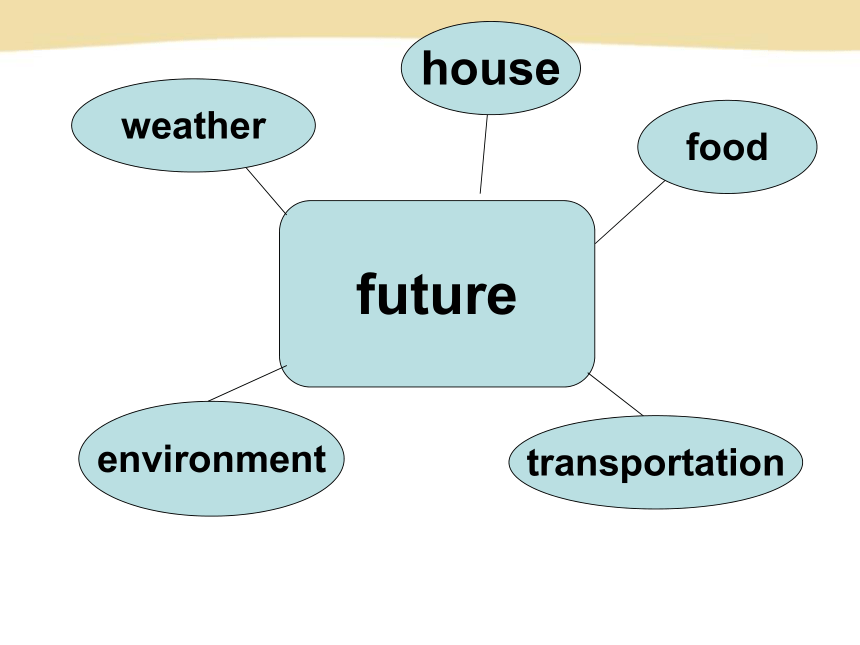
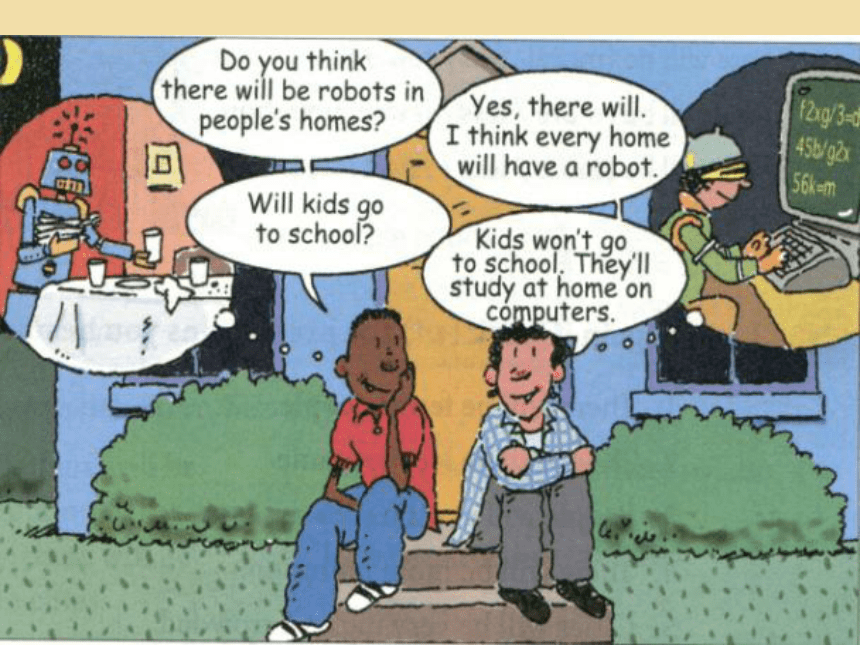
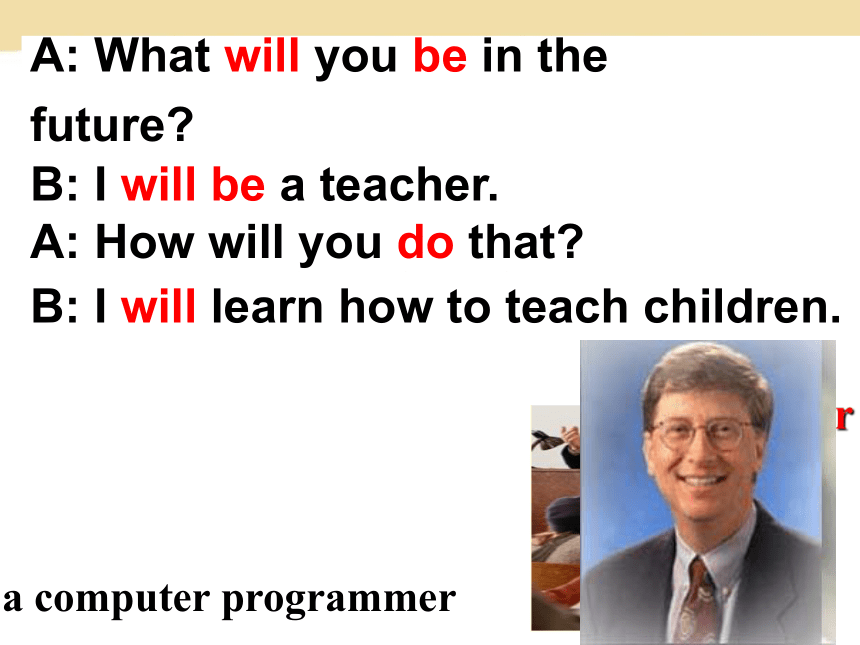
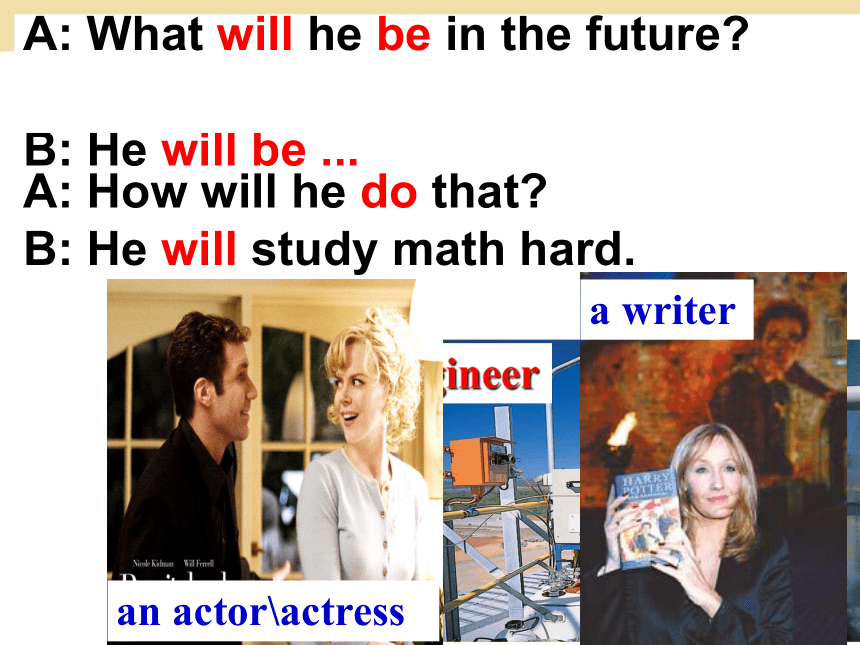
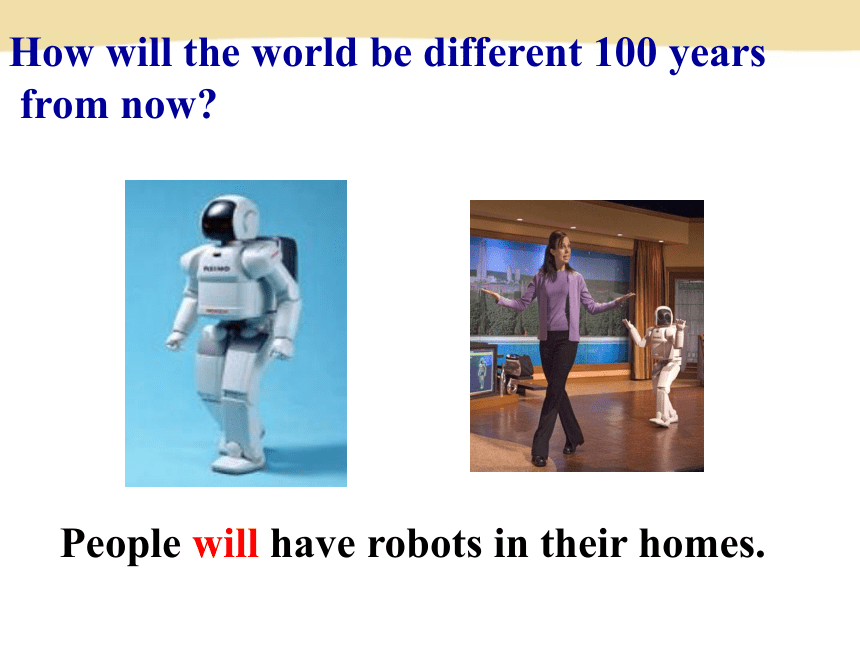
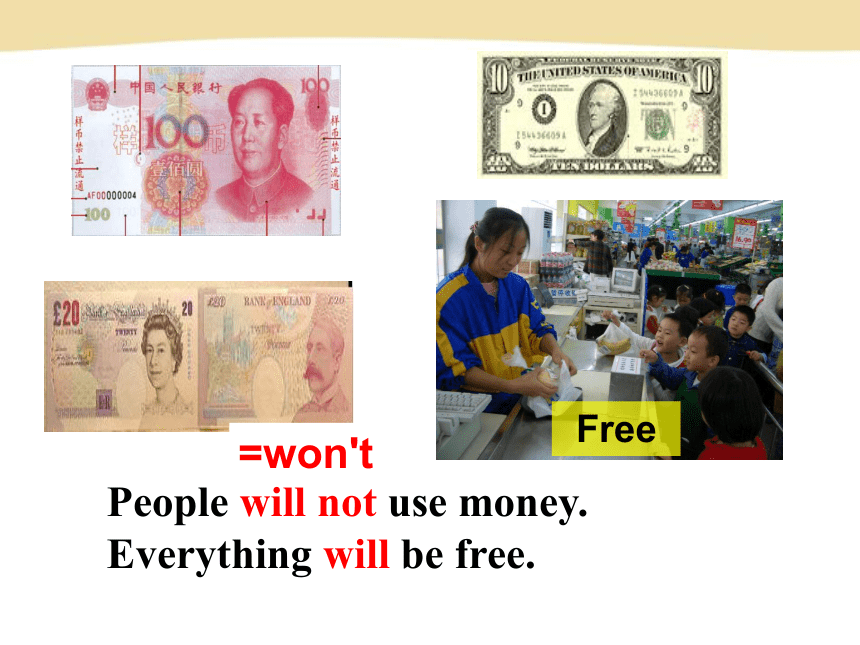
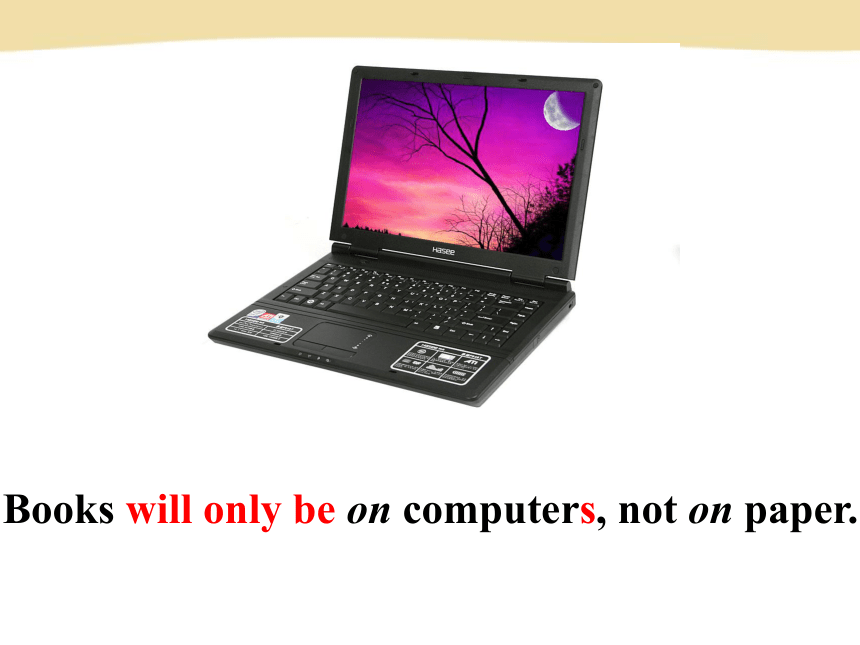
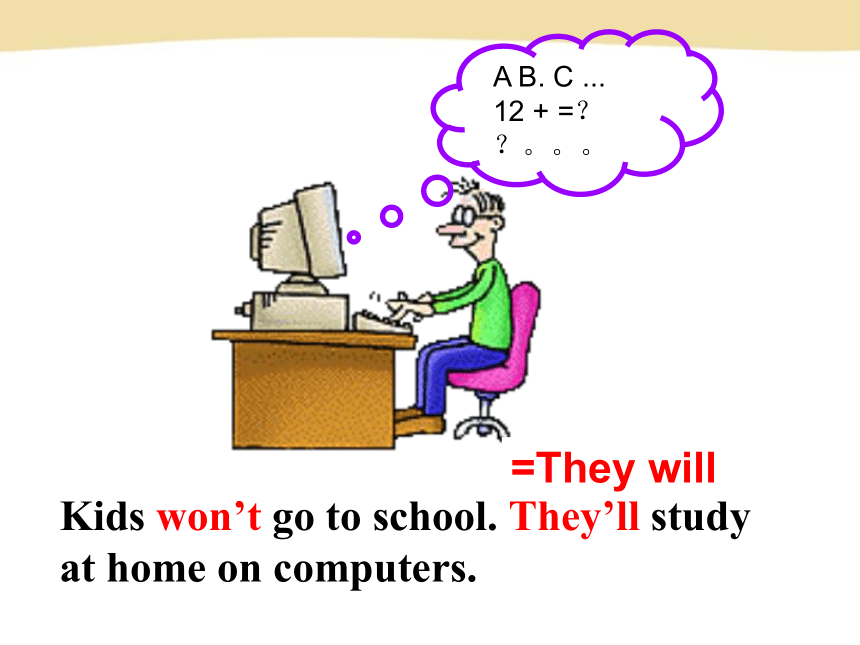
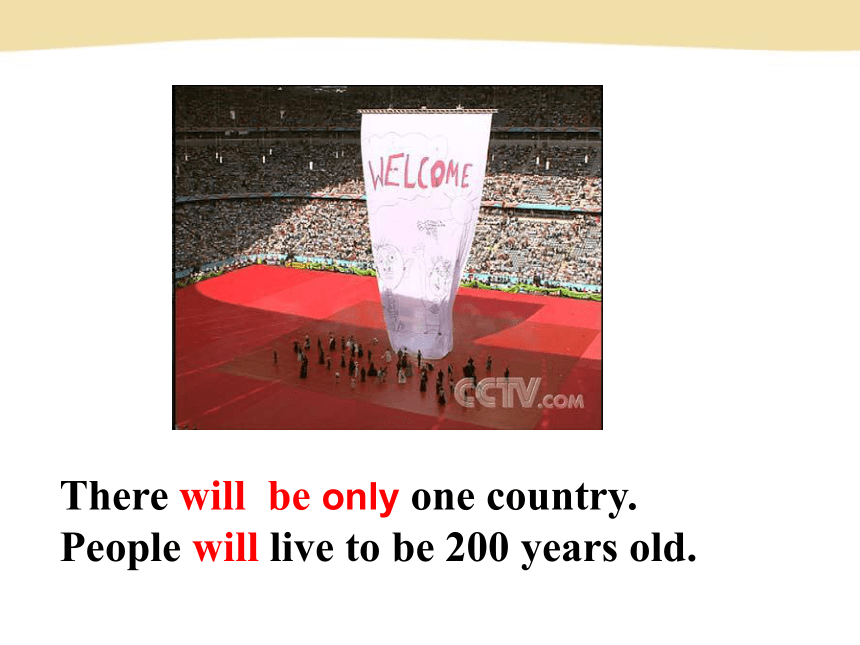
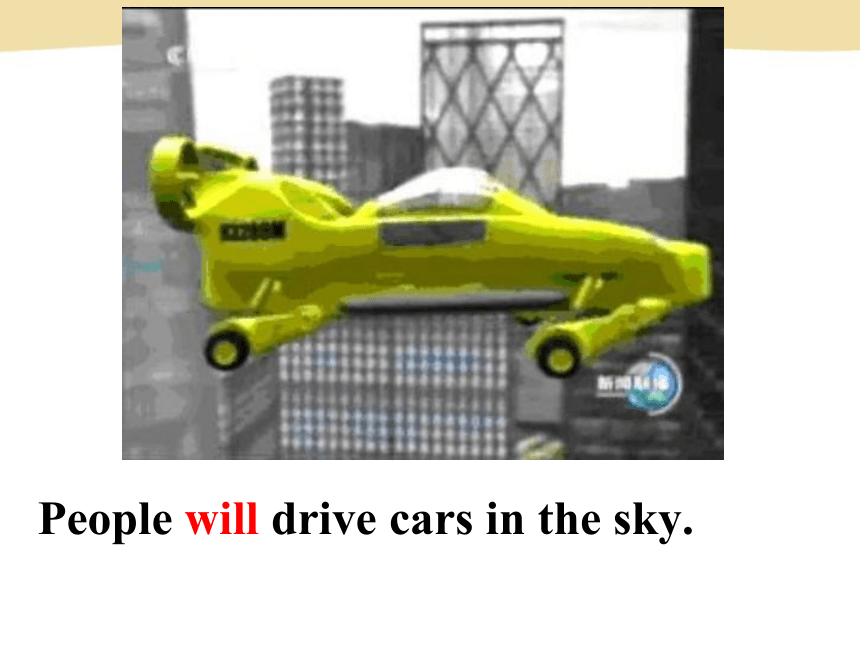
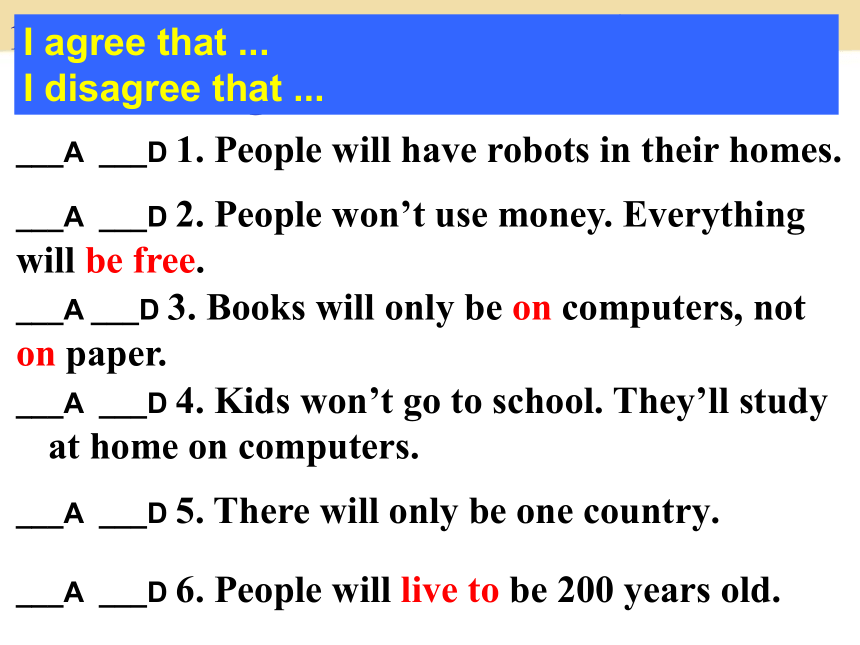
文档简介
(共48张PPT)
Unit 7
Will people have robots
future
weather
food
environment
transportation
house
B: I am going to learn how to teach children.
A: What are you going to be in the
future
B: I am going to be a teacher.
teacher
A: How are you going to do that
B: I will be a teacher.
A: What will you be in the
future
A: How will you do that
B: I will learn how to teach children.
a computer programmer
A: What is he going to be in the future
B: He is going to be a/an…
engineer
A: How is he going to do that
B: He is going to study math hard.
B: He will be ...
A: What will he be in the future
A: How will he do that
B: He will study math hard.
a writer
an actor\actress
How will the world be different 100 years
from now
People will have robots in their homes.
People will not use money. Everything will be free.
Free
=won't
Books will only be on computers, not on paper.
A B. C ...
12 + =?
?。。。
Kids won’t go to school. They’ll study
at home on computers.
=They will
There will be only one country.
People will live to be 200 years old.
People will drive cars in the sky.
1a Read these predictions. Check ( √ ) A for agree or D for disagree.
___A ___D 1. People will have robots in their homes.
___A ___D 2. People won’t use money. Everything
will be free.
___A ___D 6. People will live to be 200 years old.
___A ___D 3. Books will only be on computers, not
on paper.
___A ___D 4. Kids won’t go to school. They’ll study at home on computers.
___A ___D 5. There will only be one country.
I agree that ...
I disagree that ...
What are the people talking about in the conversation
1b Listen and circle questions you hear in 1a.
People will have robots in their homes.
People won’t use money. Everything will be free.
Books will only be on computers, not on paper.
Kids won’t go to school. They’ll study at home on computers.
There will only be one country.
People will live to be 200 years old.
1c Ask and answer questions about the
predictions in 1a.
A: Will people use money in 100 years
B: No, they won’t.
Everything will be free. Will people live to be
200 years old
A: Yes, they will.
Well, I don’t think…/Oh, I disagree.
I hope so./ Yeah, probably.
Discussion
People won’t use money. Everything will be free.
2. Kids won’t go to school. They’ll study at home on computers.
I agree that…because…
I disagree that…because…
Do you agree with it Why or why not
Unit 7
Will people have robots
Things Yes/No
people use money X
everything(free)
books be on computers √
kids go to school X study at home
people live to be 150 years old √
A: Will people use money in 100 years
B: No, they won’t. Everything will be free.
…
…
…
How many people are there in the picture
What else can you see in the picture
2a Listen and circle the words you hear.
There will be(more / less / fewer)people.
There will be (more / less / fewer) free time.
There will be (more / less / fewer) cars.
There will be (more / less / fewer) pollution.
There will be (more / less / fewer) trees.
There will be + more/less/fewer+名词.
fewer less more
fewer 更少的, 修饰可数名词
less 更少的, 修饰不可数名词
more 更多的, 可以修饰可数和不可数名词
同类事情的比较
2b Listen again. Check ( √) the predictions
you hear.
There will be fewer people. _______
There will be less free time. ______
People will use the subways less. ______
There will be more pollution. ______
Cities will be very big and crowded. ____
√
√
2c Make conversations about the predictions in
2a and 2b.
A: What’s your prediction about the future
B: I think there will be more pollution.
A: Really I don’t think so. But I think there
will be fewer trees.
…
…
…
…
Questions:
What is Jill reading
What will the future be like according to the book about the future
What can people do to save the earth
2d Role-play the conversation.
Nick: What are you reading, Jill
Jill: It’s a book about the future.
Nick: Sounds cool. So what will the
future be like
Jill: Well, cities will be more crowded and
polluted. There will be fewer trees and the
environment will be in great danger.
Nick: That sounds bad! Will
we have to move to other
planets
Jill: Maybe. But I want to live
on the earth.
Nick: Me, too. Then what can we do
Jill: We can use less water and plant more trees.
Everyone should play a part in saving the
earth.
play a part in… “参与……; 在…… 中尽自己一份力量”
She plays a part in teaching these poor
children.
He didn’t play a part in making this decision.
play a part in doing sth.
play a role in (doing) sth.
2d Role-play the conversation.
Nick: What are you reading, Jill
Jill: It’s a book about the future.
Nick: Sounds cool. So what will the
future be like
Jill: Well, cities will be more crowded and
polluted. There will be fewer trees and the
environment will be in great danger.
Nick: That sounds bad! Will
we have to move to other
planets
Jill: Maybe. But I want to live
on the earth.
Nick: Me, too. Then what can we do
Jill: We can use less water and plant more trees.
Everyone should play a part in saving the
earth.
Unit 7
Will people have robots
Show Time!!
People will use money in 100 years.
一般疑问句
Will people use money in 100 years
肯定回答
Yes, they will.
否定回答
No, they won’ t. Everything will be free.
否定句
People won’ t use money in 100 years.
就画线部分提问
What will people do in 100 years
Kids will study at home on computers.
否定句
Kids won't study at home on computers.
一般疑问句
Will kids study at home on computers
肯定回答
Yes, they will.
否定回答
No, they won't.
They won't go to school.
就划线部分提问
Where will kids study on computers
How will kids study at home
There will be world peace in 200 years.
否定句
There won't be world peace.
一般疑问句
Will there be world peace
回答
Yes, there will./ No, there won't.
Yes, I hope so.
Yes, I think so.
Yes, I guess so.
就划线部分提问
How soon will there be world peace
When will there be world peace
What will the future be like
Cities will be polluted.
And there will be trees.
There will be more people.
There will be pollution.
There will be free time.
more
fewer
more
less
’ll = will
won’t = will not
I'm =I am
You’re = you are
There's = there is
There’re = there are
Don’t = do not
Doesn’t = does not
Grammar Focus
一般将来时—— The simple future tense
概念:
(1)表示将要发生的动作或存在的状态。
We will go to see him tomorrow.
(2)表示将来经常或反复发生的动作。
From now on, I will come every day.
肯定句
否定句
一般疑问句
特殊疑问句
主语 + will +V原形
主语 + will +not + V原形
Will +主语 + V原形
特殊疑问词 + 一般疑问句
2. 基本句型
简略回答
Yes, I will.
No, I won’t. (注意缩写形式)
3. Will 表示将来时态,其后常跟的时间
状语
tomorrow 明天 soon 不久
next year 明年 next week 下周
next month 下个月
the day after tomorrow 后天
the year after next 后年
the week after next 下下周
一般将来时—— The simple future tense
There be 的一般将来时,表示:将来存在有
(1)肯定句:there will be…
e.g. There will be more people.
(2)否定句:there won’t be…
e.g. There won’t be more buildings.
be going to + V原形
1)表示计划、打算去做某事, 这种计划和打算
往往是事前就有的。
e.g. She is going to leave tomorrow.
There is going to be a football match after class.
2) 表示人根据已有的事实和迹象, 认为某事即将
发生.
It’s going to rain.
3a Fill in the blanks with more, less or fewer.
In the future, there will be _______fresh water because there will be_______ pollution in the sea.
2. In 100 years, there will be_______ cars because there will be ________ people in the cities.
more
less
more
more
3. There will be_______ jobs for people because_______ robots will do the same jobs as people.
4. I think there will be______ cities because
people will build_______ buildings in
the country.
5. In 50 years, people will have ______free time because there will be_____things to do.
fewer
more
more
more
less
more
3b Complete the predictions with what you
think will happen.
Kids study at school now. In 100 years,
___________________________________
2. I sometimes see blue skies in my city, but
in the future _______________________
__________________________________
kids will study at home on computers.
I will often see the blue skies,
because there will be less pollution.
I sometimes see blue skies in my city…
skies用作复数,表示天气或某地的天空看上去怎样
a land of blue skies and warm sunshine.
当只指 “天空” 时,sky 通常用单数形式,There wasn't a cloud in the sky.
4. Families usually spend time together on
weekends, but maybe in 200 years______
___________________________________
___________________________________
3. People now usually live to be about 70-80
years old, but in the future_____________
____________________________________
people will live to be 200 years pld.
everyday can be weekend, because
they have robots to do everything.
I think there will be more tall buildings, and there will be fewer cars and more buses.
3c Draw a picture of what you think a city in
the future will be like. Then describe it to
the class.
Unit 7
Will people have robots
future
weather
food
environment
transportation
house
B: I am going to learn how to teach children.
A: What are you going to be in the
future
B: I am going to be a teacher.
teacher
A: How are you going to do that
B: I will be a teacher.
A: What will you be in the
future
A: How will you do that
B: I will learn how to teach children.
a computer programmer
A: What is he going to be in the future
B: He is going to be a/an…
engineer
A: How is he going to do that
B: He is going to study math hard.
B: He will be ...
A: What will he be in the future
A: How will he do that
B: He will study math hard.
a writer
an actor\actress
How will the world be different 100 years
from now
People will have robots in their homes.
People will not use money. Everything will be free.
Free
=won't
Books will only be on computers, not on paper.
A B. C ...
12 + =?
?。。。
Kids won’t go to school. They’ll study
at home on computers.
=They will
There will be only one country.
People will live to be 200 years old.
People will drive cars in the sky.
1a Read these predictions. Check ( √ ) A for agree or D for disagree.
___A ___D 1. People will have robots in their homes.
___A ___D 2. People won’t use money. Everything
will be free.
___A ___D 6. People will live to be 200 years old.
___A ___D 3. Books will only be on computers, not
on paper.
___A ___D 4. Kids won’t go to school. They’ll study at home on computers.
___A ___D 5. There will only be one country.
I agree that ...
I disagree that ...
What are the people talking about in the conversation
1b Listen and circle questions you hear in 1a.
People will have robots in their homes.
People won’t use money. Everything will be free.
Books will only be on computers, not on paper.
Kids won’t go to school. They’ll study at home on computers.
There will only be one country.
People will live to be 200 years old.
1c Ask and answer questions about the
predictions in 1a.
A: Will people use money in 100 years
B: No, they won’t.
Everything will be free. Will people live to be
200 years old
A: Yes, they will.
Well, I don’t think…/Oh, I disagree.
I hope so./ Yeah, probably.
Discussion
People won’t use money. Everything will be free.
2. Kids won’t go to school. They’ll study at home on computers.
I agree that…because…
I disagree that…because…
Do you agree with it Why or why not
Unit 7
Will people have robots
Things Yes/No
people use money X
everything(free)
books be on computers √
kids go to school X study at home
people live to be 150 years old √
A: Will people use money in 100 years
B: No, they won’t. Everything will be free.
…
…
…
How many people are there in the picture
What else can you see in the picture
2a Listen and circle the words you hear.
There will be(more / less / fewer)people.
There will be (more / less / fewer) free time.
There will be (more / less / fewer) cars.
There will be (more / less / fewer) pollution.
There will be (more / less / fewer) trees.
There will be + more/less/fewer+名词.
fewer less more
fewer 更少的, 修饰可数名词
less 更少的, 修饰不可数名词
more 更多的, 可以修饰可数和不可数名词
同类事情的比较
2b Listen again. Check ( √) the predictions
you hear.
There will be fewer people. _______
There will be less free time. ______
People will use the subways less. ______
There will be more pollution. ______
Cities will be very big and crowded. ____
√
√
2c Make conversations about the predictions in
2a and 2b.
A: What’s your prediction about the future
B: I think there will be more pollution.
A: Really I don’t think so. But I think there
will be fewer trees.
…
…
…
…
Questions:
What is Jill reading
What will the future be like according to the book about the future
What can people do to save the earth
2d Role-play the conversation.
Nick: What are you reading, Jill
Jill: It’s a book about the future.
Nick: Sounds cool. So what will the
future be like
Jill: Well, cities will be more crowded and
polluted. There will be fewer trees and the
environment will be in great danger.
Nick: That sounds bad! Will
we have to move to other
planets
Jill: Maybe. But I want to live
on the earth.
Nick: Me, too. Then what can we do
Jill: We can use less water and plant more trees.
Everyone should play a part in saving the
earth.
play a part in… “参与……; 在…… 中尽自己一份力量”
She plays a part in teaching these poor
children.
He didn’t play a part in making this decision.
play a part in doing sth.
play a role in (doing) sth.
2d Role-play the conversation.
Nick: What are you reading, Jill
Jill: It’s a book about the future.
Nick: Sounds cool. So what will the
future be like
Jill: Well, cities will be more crowded and
polluted. There will be fewer trees and the
environment will be in great danger.
Nick: That sounds bad! Will
we have to move to other
planets
Jill: Maybe. But I want to live
on the earth.
Nick: Me, too. Then what can we do
Jill: We can use less water and plant more trees.
Everyone should play a part in saving the
earth.
Unit 7
Will people have robots
Show Time!!
People will use money in 100 years.
一般疑问句
Will people use money in 100 years
肯定回答
Yes, they will.
否定回答
No, they won’ t. Everything will be free.
否定句
People won’ t use money in 100 years.
就画线部分提问
What will people do in 100 years
Kids will study at home on computers.
否定句
Kids won't study at home on computers.
一般疑问句
Will kids study at home on computers
肯定回答
Yes, they will.
否定回答
No, they won't.
They won't go to school.
就划线部分提问
Where will kids study on computers
How will kids study at home
There will be world peace in 200 years.
否定句
There won't be world peace.
一般疑问句
Will there be world peace
回答
Yes, there will./ No, there won't.
Yes, I hope so.
Yes, I think so.
Yes, I guess so.
就划线部分提问
How soon will there be world peace
When will there be world peace
What will the future be like
Cities will be polluted.
And there will be trees.
There will be more people.
There will be pollution.
There will be free time.
more
fewer
more
less
’ll = will
won’t = will not
I'm =I am
You’re = you are
There's = there is
There’re = there are
Don’t = do not
Doesn’t = does not
Grammar Focus
一般将来时—— The simple future tense
概念:
(1)表示将要发生的动作或存在的状态。
We will go to see him tomorrow.
(2)表示将来经常或反复发生的动作。
From now on, I will come every day.
肯定句
否定句
一般疑问句
特殊疑问句
主语 + will +V原形
主语 + will +not + V原形
Will +主语 + V原形
特殊疑问词 + 一般疑问句
2. 基本句型
简略回答
Yes, I will.
No, I won’t. (注意缩写形式)
3. Will 表示将来时态,其后常跟的时间
状语
tomorrow 明天 soon 不久
next year 明年 next week 下周
next month 下个月
the day after tomorrow 后天
the year after next 后年
the week after next 下下周
一般将来时—— The simple future tense
There be 的一般将来时,表示:将来存在有
(1)肯定句:there will be…
e.g. There will be more people.
(2)否定句:there won’t be…
e.g. There won’t be more buildings.
be going to + V原形
1)表示计划、打算去做某事, 这种计划和打算
往往是事前就有的。
e.g. She is going to leave tomorrow.
There is going to be a football match after class.
2) 表示人根据已有的事实和迹象, 认为某事即将
发生.
It’s going to rain.
3a Fill in the blanks with more, less or fewer.
In the future, there will be _______fresh water because there will be_______ pollution in the sea.
2. In 100 years, there will be_______ cars because there will be ________ people in the cities.
more
less
more
more
3. There will be_______ jobs for people because_______ robots will do the same jobs as people.
4. I think there will be______ cities because
people will build_______ buildings in
the country.
5. In 50 years, people will have ______free time because there will be_____things to do.
fewer
more
more
more
less
more
3b Complete the predictions with what you
think will happen.
Kids study at school now. In 100 years,
___________________________________
2. I sometimes see blue skies in my city, but
in the future _______________________
__________________________________
kids will study at home on computers.
I will often see the blue skies,
because there will be less pollution.
I sometimes see blue skies in my city…
skies用作复数,表示天气或某地的天空看上去怎样
a land of blue skies and warm sunshine.
当只指 “天空” 时,sky 通常用单数形式,There wasn't a cloud in the sky.
4. Families usually spend time together on
weekends, but maybe in 200 years______
___________________________________
___________________________________
3. People now usually live to be about 70-80
years old, but in the future_____________
____________________________________
people will live to be 200 years pld.
everyday can be weekend, because
they have robots to do everything.
I think there will be more tall buildings, and there will be fewer cars and more buses.
3c Draw a picture of what you think a city in
the future will be like. Then describe it to
the class.
同课章节目录
- Unit 1 Where did you go on vacation?
- Section A
- Section B
- Unit 2 How often do you exercise?
- Section A
- Section B
- Unit 3 I'm more outgoing than my sister.
- Section A
- Section B
- Unit 4 What's the best movie theater?
- Section A
- Section B
- Unit 5 Do you want to watch a game show?
- Section A
- Section B
- Unit 6 I'm going to study computer science.
- Section A
- Section B
- Unit 7 Will people have robots?
- Section A
- Section B
- Unit 8 How do you make a banana milk shake?
- Section A
- Section B
- Unit 9 Can you come to my party?
- Section A
- Section B
- Unit 10 If you go to the party, you'll have a grea
- Section A
- Section B
